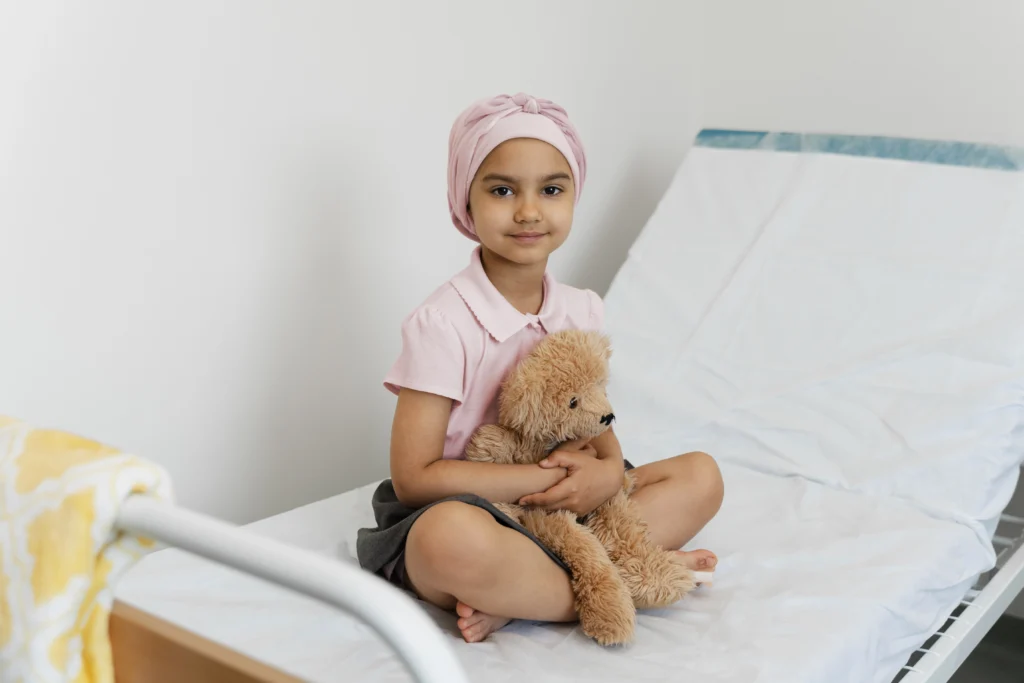Cancer is a devastating disease that affects people of all ages, including children. Pediatric oncology is the specialized field of medicine dedicated to the diagnosis, treatment, and care of children with cancer. Understanding the unique aspects of pediatric oncology is crucial in order to provide comprehensive support and the best possible outcomes for these young patients and their families.
Types of Cancers
- Leukemia: Leukemia is the most common type of childhood cancer, accounting for about 30% of cases. It affects the bone marrow and blood, leading to the abnormal production of white blood cells. The two main types of leukemia seen in children are acute lymphoblastic leukemia (ALL) and acute myeloid leukemia (AML).
- Brain and Central Nervous System (CNS) Tumors: Brain and CNS tumors are the second most common type of childhood cancer. These tumors can occur in various parts of the brain or spinal cord. Common types of brain tumors in children include medulloblastoma, gliomas, ependymomas, and astrocytomas. The symptoms and treatment options vary depending on the tumor’s location and characteristics.
- Neuroblastoma: Neuroblastoma is a cancer that arises from immature nerve cells called neuroblasts. It typically develops in the adrenal glands, which are located on top of the kidneys. Neuroblastoma mainly affects children under the age of five. The tumor can also occur in nerve tissue along the spine, chest, abdomen, or pelvis.
- Wilms Tumor: Wilms tumor, also known as nephroblastoma, is a kidney cancer that primarily affects children aged 3 to 4 years. It usually develops in one kidney, but in some cases, it can affect both kidneys. Wilms tumor is often curable, especially when detected early and treated with a combination of surgery, chemotherapy, and sometimes radiation therapy.
- Retinoblastoma: Retinoblastoma is a rare eye cancer that primarily affects young children, typically before the age of five. It develops in the retina, the light-sensitive tissue at the back of the eye. Retinoblastoma may affect one or both eyes and can lead to vision loss or eye removal. Prompt diagnosis and treatment are essential for preserving vision and preventing the spread of the disease.
- Bone Cancer: Bone cancer in children typically includes two main types: osteosarcoma and Ewing sarcoma. Osteosarcoma is the most common bone cancer in children and adolescents, often occurring during periods of rapid bone growth. Ewing sarcoma affects bones or soft tissues, usually in the pelvis, legs, or arms. Both types of bone cancer require a multidisciplinary approach involving surgery, chemotherapy, and sometimes radiation therapy.
- Lymphoma: Lymphomas are cancers that affect the lymphatic system, which is a part of the immune system. In children, the two main types of lymphoma are Hodgkin lymphoma (HL) and non-Hodgkin lymphoma (NHL). Hodgkin lymphoma is characterized by the presence of Reed-Sternberg cells and usually occurs in adolescents and young adults. Non-Hodgkin lymphoma includes various subtypes and can affect children of any age.

Emotional Considerations and Support
Childhood cancer not only affects the physical health of the child but also has a profound impact on their emotional well-being and the entire family. Here are some important aspects to consider regarding emotional considerations and support in pediatric oncology:
Impact on the Child and Family
- Emotional distress: Children with cancer may experience a range of emotions, including fear, anxiety, sadness, anger, and confusion. The diagnosis, treatment procedures, and hospitalizations can be overwhelming for both the child and their family members.
- Lifestyle disruptions: Childhood cancer often requires lengthy treatment protocols, leading to significant disruptions in the child’s daily life, school attendance, social interactions, and hobbies. Families may face financial challenges, job instability, and increased stress due to the demands of caregiving and treatment.
- Grief and loss: Families may experience grief and a sense of loss for the normalcy of their lives before the cancer diagnosis. Dreams, expectations, and future plans may need to be reshaped in light of the child’s illness.
Psychosocial Support
- Counseling and therapy: Mental health professionals, such as psychologists or social workers, can provide counseling services to help children and their families cope with the emotional challenges of cancer. Individual therapy, play therapy, and family therapy may be utilized to address specific needs.
- Support groups: Participating in support groups can offer children and parents the opportunity to connect with others who are going through similar experiences. Sharing concerns, insights, and coping strategies can provide a sense of community and emotional support.
- Child life specialists: Child life specialists are trained professionals who work in pediatric healthcare settings. They play a crucial role in supporting children with cancer by providing age-appropriate explanations of medical procedures, offering play therapy to reduce anxiety, and facilitating social and educational activities in the hospital environment.
Siblings and Family Dynamics
Sibling support: Siblings of children with cancer may experience a range of emotions, including fear, confusion, jealousy, guilt, and a sense of neglect. It’s important to acknowledge and address their unique needs through sibling support programs, counseling, and educational resources.
Open communication: Honest and age-appropriate communication within the family is essential. Parents should create an environment where siblings can express their feelings, ask questions, and receive reassurance. Regular family meetings or conversations can help maintain a sense of unity and understanding.
Practical support: Families often require practical support, such as assistance with transportation, meals, and household chores. Community organizations, friends, and extended family members can play a vital role in providing this support.
Pediatric oncology is a critical field that focuses on providing specialized care to children with cancer. Understanding the types of childhood cancers, the available treatment options, and the emotional aspects of the disease is essential in supporting these young patients and their families. Continued research and advancements in pediatric oncology offer hope for improved outcomes and better quality of life for children battling cancer.